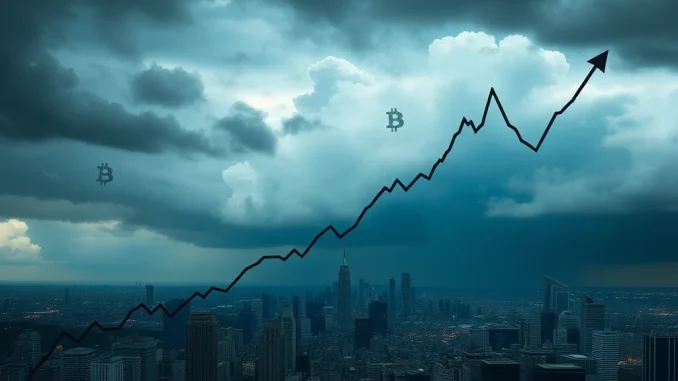
Brace yourselves, crypto enthusiasts! The rollercoaster ride of the crypto market has taken another dramatic dip, and this time, it’s hitting close to home for one of the industry’s giants. Coinbase stock, a bellwether for the crypto exchange world, has just experienced its most brutal quarter since the infamous FTX implosion of 2022. Are we witnessing a mere market correction, or is this the beginning of a deeper chill for Coinbase and the wider crypto sphere? Let’s dive into the details of this alarming downturn and what it could mean for you.
Coinbase Stock Suffers Dramatic 33% Plunge in Q1 2025
The numbers are stark and undeniably concerning. Coinbase stock ended the first quarter of 2025 at a chilling $172, a staggering 33% decrease from the quarter’s start. This isn’t just a minor setback; it’s the most significant quarterly drop since the catastrophic FTX collapse rocked the crypto world in late 2022. Think back to the turmoil and uncertainty that followed FTX – that’s the scale of concern this recent drop is evoking. According to a report from Cointelegraph, this sharp decline isn’t happening in isolation. It’s part of a broader trend affecting crypto-related stocks, suggesting a systemic issue rather than an isolated Coinbase problem.
Is the Crypto Market Downturn to Blame?
The crypto market is known for its volatility, but is a general crypto market downturn the sole culprit behind Coinbase’s woes? While the overall market sentiment certainly plays a role, it’s crucial to understand the nuances. Several factors could be contributing to this slump:
- Broader Economic Pressures: Global economic uncertainties, inflation concerns, and potential interest rate hikes can all negatively impact risk assets like cryptocurrencies and related stocks.
- Regulatory Scrutiny: Increased regulatory pressure on the crypto industry can create uncertainty and dampen investor enthusiasm.
- Market Correction: After periods of rapid growth, markets often experience corrections. This could be a natural pullback after a period of exuberance in the crypto space.
- Specific Coinbase Challenges: Beyond general market trends, Coinbase might be facing company-specific challenges, which we’ll explore further.
While a general market downturn provides context, it doesn’t fully explain the severity of Coinbase’s quarterly drop. There are deeper currents at play.
Echoes of the FTX Collapse: A Haunting Comparison
The phrase “worst quarter since the FTX collapse” is a chilling reminder of the fragility of the crypto ecosystem. The FTX debacle sent shockwaves through the industry, eroding trust and highlighting the risks associated with centralized crypto exchanges. The fact that Coinbase’s current situation is being compared to that period is deeply unsettling. While Coinbase is a fundamentally different entity than FTX, the comparison raises questions about systemic vulnerabilities and investor confidence. Are investors becoming more risk-averse after witnessing the dramatic downfall of FTX? Is this a sign of lingering fear and uncertainty in the market?
Growing Concerns Over Ethereum Network Influence
Adding another layer of complexity to Coinbase’s troubles are “rising concerns over Coinbase’s growing influence on the Ethereum network operations.” This is a critical point that warrants closer examination. Why is Coinbase’s influence on Ethereum raising eyebrows?
- Centralization Risks: Decentralization is a core tenet of blockchain technology. If a single entity, even a reputable one like Coinbase, exerts significant influence over a major network like Ethereum, it can raise concerns about centralization and potential points of failure.
- Validator Dominance: Coinbase’s staking services and validator operations might be giving it disproportionate control over transaction validation and network governance on Ethereum.
- Regulatory Implications: Increased influence could attract unwanted regulatory scrutiny. Regulators might be wary of concentrated power within decentralized networks.
- Community Distrust: The Ethereum community, known for its commitment to decentralization, might view growing centralized influence with suspicion and concern.
This concern about Ethereum network influence is not just about Coinbase’s performance; it’s about the fundamental principles of blockchain and the long-term health of the Ethereum ecosystem. It’s a complex issue with potentially far-reaching consequences.
Q1 2025: A Quarter to Forget for Coinbase?
Q1 2025 will undoubtedly be marked as a challenging period for Coinbase. The 33% stock drop, the comparison to the FTX collapse, and the Ethereum network influence concerns paint a worrying picture. However, it’s essential to maintain perspective. Coinbase remains a significant player in the crypto space, with a large user base and a strong brand. This downturn, while serious, doesn’t necessarily signal the end.
Actionable Insights and What’s Next
So, what should crypto investors and enthusiasts take away from this situation?
- Stay Informed: Keep a close watch on Coinbase’s performance and any further developments regarding its Ethereum network influence.
- Diversify: Don’t put all your eggs in one basket. Diversify your crypto investments and holdings.
- Risk Management: Understand the inherent risks in the crypto market and manage your portfolio accordingly.
- Long-Term Perspective: The crypto market is cyclical. Downturns are often followed by periods of growth. Maintain a long-term perspective and avoid panic selling.
- Decentralization Advocacy: Support projects and initiatives that promote decentralization within the crypto ecosystem.
Conclusion: Navigating the Crypto Storm
Coinbase’s shocking Q1 2025 performance serves as a stark reminder of the volatile nature of the crypto market and the challenges facing even established players. While the 33% stock plunge and the echoes of the FTX collapse are concerning, they also present an opportunity for reflection and strategic adjustments. The crypto world is constantly evolving, and navigating these storms requires vigilance, informed decision-making, and a commitment to the core principles of decentralization and innovation. The coming quarters will be crucial in determining whether Coinbase can weather this storm and what the broader implications are for the future of crypto exchanges and the Ethereum network.



